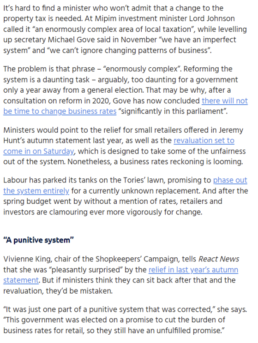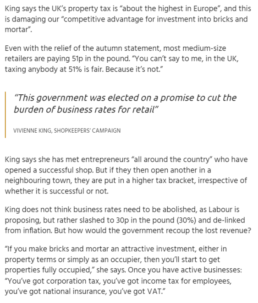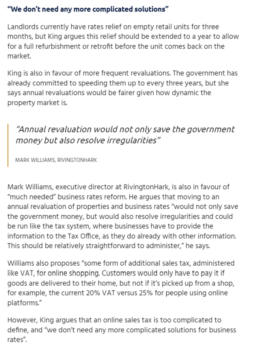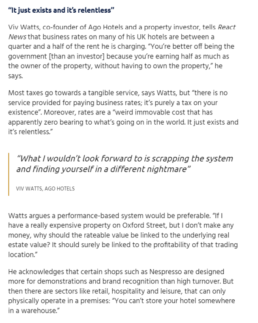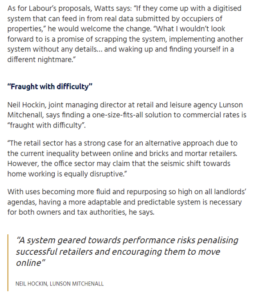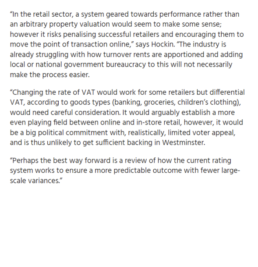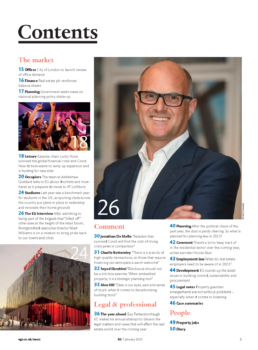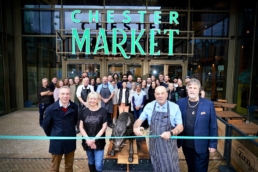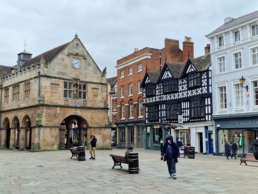Business Rate Reforms - RivingtonHark's Proposals in React News
RivingtonHark were quoted in this weeks article in React News
St Johns Shopping Centre Car Park Features in Retail Destination
St Johns Shopping Centre Car Park described as the friendliest, most convenient place to park in the city
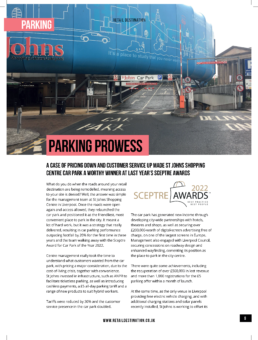
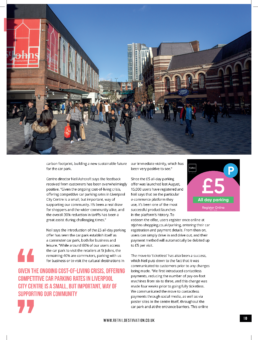
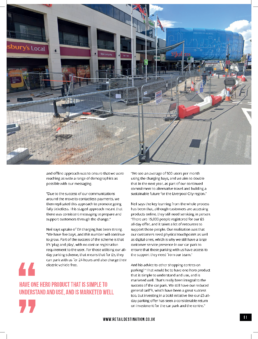
Boom Battle Bar to open in Victoria Shopping Centre
BOOM! The Victoria Centre in Southend Welcomes Boom Battle Bar
RivingtonHark are delighted to announce that the Victoria Shopping Centre in Southend has added to its ever-growing list of attractions with the news that Boom Battle Bar is coming to the centre later this year.
The newest leisure attraction to Southend brings people together to compete in a variety of crazy games in a fun, social way. Combining nine-hole mini golf, darts, ping-pong, virtual reality, shuffleboarding, karaoke, pool and axe throwing with an urban themed bar. Boom Battle Bar spearheads a brand-new era in social entertainment venues.
The tenant will take over the unit formerly housing Tangs, covering approximately 10,500 square feet across both the ground and first floor. Contracts have been exchanged and the team at Boom Battle Bar is set to begin works on fitting out the unit, including creating a new entrance to the venue, with a planned summer 2023 opening date.

Richard Harpham, Chief Executive Officer at Boom Battle Bar, said: “We’re excited to be bringing the Boom experience to the iconic Southend-on-Sea with our newest Boom Battle Bar venue. After the success of our venues in Chelmsford and Lakeside, we can’t wait to welcome crowds of locals and tourists alike.
“We look forward to them playing our most sought-after games, from axe throwing to prosecco, beer pong, and singing in our Boom Box private karaoke booths. With cocktails, street food, live sport on large screens and DJ’s spinning – we just cannot wait to get the doors open.”
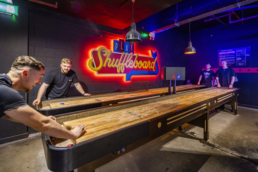
Will Ashdown, Asset Manager at RivingtonHark commented: “The letting to Boom Battle Bar is an important step in our continuing journey to revitalise the centre and, in particular, our aim of bringing in more leisure activities into the scheme.
“It has been great to deal with the Boom Battle Bar team who have shown their passion about bringing their business into Southend and who share our view on the positive impact we envisage this letting will have on the city. We’re confident that Boom Battle Bar will be the new go-to place for fun-seekers in Southend and we can’t wait to see them open later this year.”
The new Boom Battle Bar is due to open in summer 2023. For more information about the bar and other attractions at Victoria Shopping Centre in Southend, please visit the centre’s website.
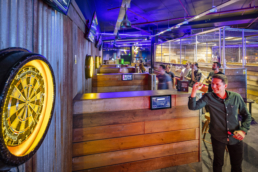
Why 'Hybrid Destinations' are the Future of Shopping Centres
Why 'Hybrid Destinations' are the Future of Shopping Centres
As consumer demands change, shopping centres are having to shift their focus – and their future lies in becoming ‘hybrid destinations’, says Mark Harvey of RivingtonHark.
On a trip to Yorkshire, I was slightly surprised to find half the local pub given over to shelves of everyday provisions. Bringing the village shop under the same roof as the beer pumps had not only reduced costs, but increased spending on both ale and groceries, as shoppers stayed for a pint and drinkers picked up lastminute essentials. There were plans to host some basic post office services. Less village pub, more community hub.
The pub’s shift is a very basic version of the perennial challenge facing shopping centre owners: getting the offer right. Landlords have long understood that an asset’s success is dependent on it reflecting the needs and wants of the customer base. Traditionally that meant food and beverage options to attract people and extend dwell time; latterly leisure options have come to the fore, such as we have undertaken during the transformation of Norwich’s Castle Quarter into a social, leisure and lifestyle destination.
Central to each transformation is that it has been driven by consumer need. Town centre shopping malls as we know them have been an asset class since the 1950s, and for nearly all that time it was retail that was the main attraction; the shift for many of these places has been swift but undeniable. If these assets and locations are to remain relevant in an age when people don’t ‘need’ to come to shopping centres if all they want to do is buy things – they can do that online – there must be other drivers for their visit. That means identifying the activities that customers ‘want’, such as leisure, or can only do in person, like healthcare.
Hybrid destinations
So, if the pre-eminence of retailers has waned, what is it that consumers now need? What can these centres provide to attract the footfall needed to remain viable?
There is no one-size-fits-all answer. For the major regional schemes – the likes of Bluewater and the Trafford Centre – the model remains similar to what has gone before. Leisure and dining are increasingly important here, but ultimately the largest stores and the biggest brands continue to attract shoppers. But for town and city centre sites, there are as many answers as there are locations. It really does depend on what the community needs.
That could mean artisan and street food style dining options. Competitive leisure – attracting a different audience and extending trading hours – will be the way to go for some. Ancillary services such as Amazon lockers and in-person-only stores (think opticians and dry cleaners) can play a vital role. Click-and-collect continues to grow in significance, as retailers look to make optimise their physical space within their businesses, bringing with it a halo effect of customers buying other things while in-store. Flexible workspace is a possibility. Health and wellbeing – NHS centres, dentists – are increasingly important. As are social infrastructure uses such as job centres and public-facing council services. In some cases Council office relocations into shopping centres could work.
What we are seeing is the redundancy of the traditional shopping centre and its transformation into a hybrid destination, attracting a huge range of visitors with different requirements and reasons to drop by. In one visit, they can pick up a new outfit, return an online delivery, take a yoga class, grab something to eat and watch a film, socialise with friends or do some work. The exact mix will be different for each centre, but the aim remains the same: identify what the need is.
Shifting focus
This thinking has certainly underpinned the transformation of Castle Quarter. Having identified a lack of leisure options in Norwich city centre, a scheme that was once almost entirely retail has been repositioned so that it is now a 50/50 split between shops and leisure operators. The pivot has seen Castle Quarter become Norwich’s leading ‘social, leisure and lifestyle’ destination.
In all, some 90,000 sq ft of space at Castle Quarter has been shifted towards leisure, entertainment and F&B. That means leisure operators such as Escape Hunt, Boom Battle Bar, Putt Putt Noddle, Spy Missions, Vue cinema, Superbowl and PureGym, alongside a new ‘market hall’ style street food and entertainment concept across the entire top floor of the scheme. It is the first such asset to successfully undertaken a repositioning of this scope and scale.
Retail has been far from abandoned and is still a key attraction, with major brands such as Boots, TK Maxx and The Entertainer as long-term occupiers. But the transformation has had a huge effect on visitor profile and overall trading performance, drawing further strength from the clustering effect of having such a range of leisure options under one roof.
Footfall within Castle Quarter is comfortably outperforming the wider city centre. Trading hours have been extended into the evenings, bringing success not only to the leisure operators themselves, but also creating opportunities for improved performance among those retailers that are able to capitalise. Dwell time has increased too, as visitors take advantage of everything that is on offer.
We’ve found this mix of leisure, lifestyle and social – complementing the existing retail – has created the ideal destination for central Norwich. Much like the pub in Yorkshire, a diversified offer has not only generated better trading for the individual occupiers, but driven improvements in the overall performance of the asset too.
Welcome to the age of hybrid destinations.
International Women's Day at RivingtonHark
Embracing Equity
It's International Women's Day, and at RivingtonHark we are celebrating all the women in our lives who have helped us become the successful company that we are today.
At RivingtonHark, we are committed to diversity and inclusion in all aspects of our business, and we are proud of the fact that our team reflects the diversity of our clients and partners.
We’re proud of the fact that we have a wide range of ages, backgrounds, and genders represented on our team.
RivingtonHark is made up of 35% females throughout our team and across senior positions. We are committed to increasing that figure as we grow.
We also want to acknowledge the women we work with in our property management partnerships and who work in the assets we manage. They bring incomparable value to us and our clients.
We know that having a diverse workforce is good for business and good for people. It means bringing different perspectives into our decision-making process, which ultimately helps us deliver better results for our clients. It also means creating an inclusive environment where everyone feels they can thrive—and where everyone feels comfortable being their true selves at work.
We wanted to take a moment to celebrate some of the women at our company who do incredible things:

Neelum Choudhury – Head of Sustainability
When it comes to #embracingequity, I revert back to my foundation of strong females; my family, my friends and my colleagues past and present. All who have worked, continue to work, or choose to stay at home. They are fearless individuals who advocate equity in everything they do.
#Embracingequity is a journey, and I am continually learning how to do it better; recognising everyone has different circumstances, and the need to allocate the correct resources and opportunities needed to achieve an equal outcome. One thing I am sure of is that there is a place for everyone.

Amy Blackwell - Director, Asset Management
The most inspirational women in my life from an early age instilled the values of hard work, true grit, gratitude, love, care, support and giving the most precious gift of time to others.
I have not had a woman manager in my 16 year career. I hope that walking the talk with ensure my daughter does.

Handan Guler – Senior Asset Manager
Today, I would like to celebrate the power of #embraceequity by acknowledging the support of the organisations I have worked in and the wonderful network of people who have provided me with equal opportunities. Where I am today, is a clear testament to #embraceequity.

Edie Cockrell – Operations and Marketing Manager
For me, #embracingequity, and advocating for diversity and inclusivity, is about creating a culture where everyone feels comfortable bringing their true selves into whatever the scenario is.
I have been lucky in my life to be surrounded and supported by some incredible women, and my current workplace, RivingtonHark is no exception.
I try and make sure I spend time every day to listen and learn from the women in my life, and advocate for them. And I feel confident that they do the same for me.
The EG Interview - Mark Williams
The EG Interview with RivingtonHark's Mark Williams
Mark Williams explains to EG Editor, Samantha McClary, how the team at Rivingtonhark – led by the triumvirate of David Lewis, Mark Harvey and himself – are creating, evolving and improving town and city centres.
RivingtonHark’s company’s ethos is to leave places in better shape than we found them. After all “isn’t that what real estate should be doing”.
We can only achieve this with the support of our partners; Swansea Council, Cheshire West and Chester, Veld, Bury Council, Bruntwood, Ilmarinen, Redical, Lochailort, Newcastle City Council, NE1, Broxbourne Council, Southend-on-Sea, Cushman and Wakefield, DRC, DWS and Shropshire Council – plus of course the huge consultancy team we work with.
Read the article below to see how Mark Williams is representing leadership in sustainability (both ecological and community) within the industry, as we navigate the future of our high streets.
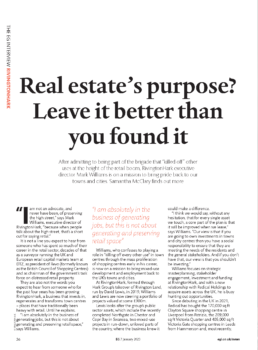

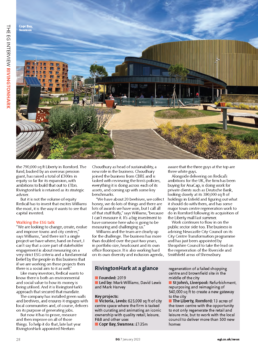
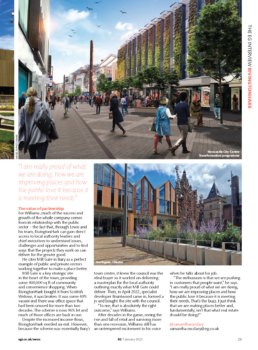
Chester Market Opens to the Public
The New Chester Market is proving a real draw
Located in the heart of Chester, in Exchange Square off Northgate Street, the new market has opened its doors and is proving hugely popular with both locals and tourists alike.
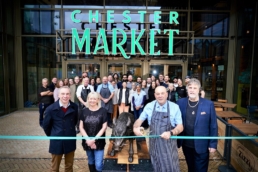
This is the first time in over 100 years that Chester Market has undergone such an extensive renovation. The original building was opened in 1876 and was designed by Alfred Waterhouse. And now, the old Victorian building has been transformed and modernised to create a multifaceted offer incorporating produce, traditional goods and a food hall.
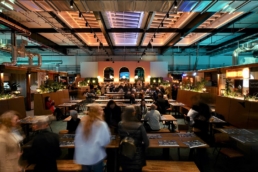
The driving force behind the new market has been to create a ‘modern traditional market’ that takes the best of the new breed of thriving city produce markets such as Borough Market in London, or Barcelona market; combined with pioneering communal food hall markets in Altrincham and Stockholm, to create a unique blend of produce, goods, food and beverage traders in a welcoming and inclusive space for everyone to enjoy – where you really can shop local and eat global.
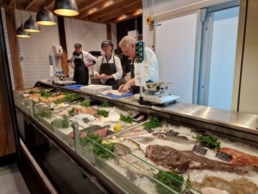
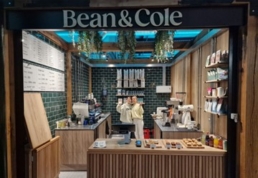
The market hall has space for 39 stalls, with over 400 seats across 3 separate areas, including a garden area, a stage and a big screen.
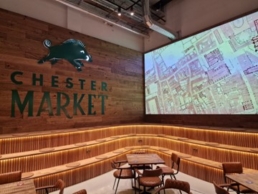
In honour of the Roman 20th Legion that was based at Northgate, their symbol of a wild boar has been used in the logo for the new market; the market’s stalls are made from 60 tonnes of air-dried oak made using traditional wooden joints, including ‘scarf’ joints which were used in the construction of ships’ keels.
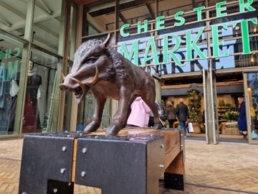
RivingtonHark has worked alongside Cheshire West and Chester Council to deliver Chester Northgate. The new market is one of the main anchors for the development and sits alongside 7 new restaurants a new 800 space multi story car park and a new 6 screen cinema opening in 2023.
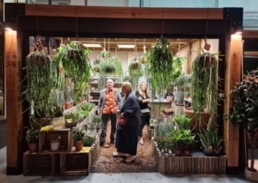
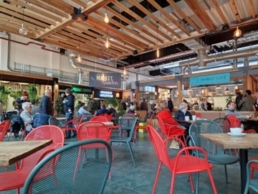
Visit the Chester Market website to find out more: https://newchester.market/
RivingtonHark selected for major regeneration project in Shrewsbury
Regeneration specialists appointed to transform riverside location in Shrewsbury town centre
RivingtonHark has been appointed by Shropshire Council to take the lead on the regeneration of Riverside and Smithfield areas in Shrewsbury which includes the Riverside and Pride Hill shopping centres.
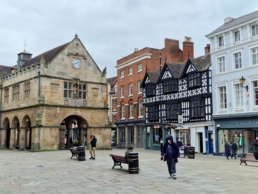
The town is famous for its historical town centre and range of independent shops. The two shopping centres have long failed to meet the needs of the town, yet occupy a significant portion of it. The project aims to reconnect Riverside and Smithfield areas to the wider town centre by delivering a modern, sustainable, and multi-functional destination for people and business in Shrewsbury. Adjacent to the River Severn, the redevelopment hopes to unlock the river as a focal point, whilst maintaining the natural beauty, architectural history and heritage the town has to offer.
Lezley Picton, Leader of the Council shared: –
“This is an exciting and pivotal moment for Shrewsbury town. Following a rigorous and competitive process, RivingtonHark will take the reins on transforming an area in Shrewsbury town centre which has immeasurable potential. This is just one of the many steps as part of a long-term strategic vision to make Shrewsbury town centre a unique and vibrant destination for all.”

Image: Representatives from Shropshire Council and RivingtonHark.
Left to right: Mark Barrow, Executive Director of Place; Spencer Winter, Projects Director, RivingtonHark; Lezley Picton, Leader of Shropshire Council; Dean Carroll, Cabinet member for growth and regeneration; David Lewis, Executive Director, RivingtonHark; Andrew Goodwin, Projects Director, RivingtonHark
Dean Carroll, Shropshire Council’s Cabinet member for growth and regeneration said: –
“I’m thrilled to have RivingtonHark on board to transform this area of the town centre. With their specialist knowledge and expertise, Shrewsbury has an extremely exciting future ahead.”
David Lewis, Executive Director at RivingtonHark shared his thoughts about the appointment: –
“We are absolutely delighted to have been selected by Shropshire Council to lead the redevelopment project. Shrewsbury is a beautiful town with many great attributes, and this site represents a major opportunity to add to the overall attraction of the town. We very much look forward to engaging with stakeholders soon, as we progress and evolve the proposals. Projects like this, in towns like Shrewsbury, is what we do, it is what we live for, and we cannot wait to get fully immersed.”
The Leisure & Social Pivot - by Mark Harvey
The Leisure & Social Pivot
Secondary retail schemes need to find a new role - time to pivot towards what consumers want, says Mark Harvey of RivingtonHark
Whether you realise it or not, your business is likely to have ‘pivoted’ many times. One of the favoured new terms in the corporate vocabulary, it brings connotations of fleet-footed start-ups ripping up their business plan and changing direction. But the reality is more prosaic – what it really means is “we saw a better opportunity and decided to go for it”.
‘Pivoting’ may be a relatively new word in real estate, but it points to something the industry has always been good at: providing the product that the end user needs. The success of the property world is bound up with finding a new use for an unloved space.
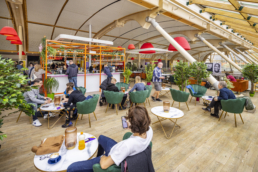
Nowhere, arguably, is this more needed than with retail assets that find themselves with a diminished role in a changing consumer environment. Secondary shopping centres, built for a world that often no longer exists, are in particular need of ambitious repurposing. This isn’t easy – by their nature, such assets were almost uniquely designed with one role in mind – but pivot they must.
For some assets this means redevelopment, usually into residential. For others, such as out-of-town retail parks – the possibility of repurposing towards last-mile logistics is a tempting one. But for many centres within over-shopped towns and cities the options are fewer. Where redevelopment is unviable, a new role for the existing space must be found.
If the situation and market allows, there is an obvious approach: follow the consumers (often easier said than done, I concede). The ‘right’ tenant mix has always underpinned successful schemes, so giving consumers what they want is a good place to start for any repositioning. But if not shops, then what?

Leisure & social
One answer is to reposition towards competitive leisure and social. Declining spend in physical stores has been matched by an increased interest in leisure from both traditional activities, such as bowling alleys and cinemas, and a whole host of innovative new operators from axe-throwing to escape rooms. At Castle Quarter in Norwich, having identified a need for these operators in the city centre, we have embraced such a repositioning strategy.
Even during difficult times, there remains discretionary spend to be captured, and competitive leisure is a great way to do so. What’s more, as with the best retail offers, there are significant clustering effects – operators want to be located near their competitors, the range of available options increasing the overall visitor numbers. This is very difficult to achieve on piecemeal high streets, but something that centres are ideally suited to.
There are other advantages too. Leisure and social operators extend both the trading day and the average dwell time, providing additional footfall for retailers to capitalise on, and increasing usage of ancillary assets such as car parks. This also translates into better opportunities for food and beverage operators, who innately understand the benefits of clustering.

At Castle Quarter, the mantra we have adopted is “social, leisure and lifestyle”, working to create a destination that people will come to relax and enjoy themselves. That means a wide range of leisure options, but also ‘social’ space for drinks, dining and entertainment. What was once a typical 1990s food court has been transformed into a ‘market hall’ style street food, bar and live music concept.
Overall, 90,000 sq ft at Castle Quarter has been let to social, leisure and lifestyle brands since the decision to pivot was made, with such operators now accounting for around 50% of the asset’s floorspace. While many owners are looking at repositioning in this way, Castle Quarter is the first to have successfully done so, an exemplar of what can be achieved.
Committed capital
Such a repositioning isn’t the right option for every asset, and even where it is the best strategy, a pivot towards leisure and social is likely to need capital investment. Owners need to be wholly committed to the
strategy, and patient with it, if their investments are to bear fruit as assets that are relevant, fit for purpose and able to avoid terminal decline.
It all comes back to providing the places and destinations that people need. Shifting consumer behaviour is asking testing questions of these assets and the role they serve; social, leisure and lifestyle is a compelling answer.
First Office Tenant Secured at Chester Northgate Development
RivingtonHark acting as development and leasing mangers on behalf of Cheshire West and Chester Council have secured Sovereign Group as the first tenant.
Sovereign will take space within the newly created and refurbished office space overlooking the public square. They are a new business to Chester, relocating from Bromborough, and are one of the largest independent corporate and trust providers with 23 offices globally. Legat Owen acted as agents in helping to secure the deal.



